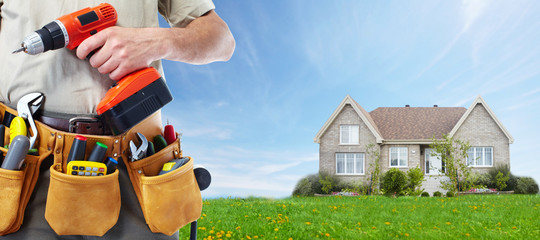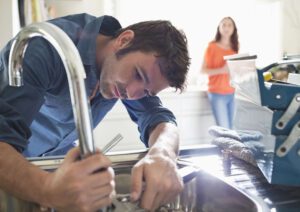Whether it’s a failing roof or a broken dishwasher, homeowners are bound to face costly home repairs. Depending on the nature of the issue, the cost can range from a few hundred dollars to thousands.
Experts recommend setting aside 1% to 4% of a home’s value for maintenance and repair expenses. This can help ensure that these expenses don’t impact your financial goals. Talk to an expert from In And Out Services for assistance.

Home repairs and maintenance are a necessary part of owning a home. But they can also be expensive, especially if you don’t plan. Taking care of your home’s needs now can save you money in the long run and keep you safe. It’s also a great way to make your home a refuge for you and your family.
The majority of homeowners don’t spend time or money on maintenance, which can lead to several problems later. From the roof to the furnace, each major component of your home requires regular maintenance to ensure it’s working properly and safely. These repairs can cost hundreds to thousands of dollars to fix, so it’s important to plan and budget for them.
In addition to making sure that your house is in good condition, home maintenance can also improve its resale value. If you are planning to sell your house in the future, it’s important to perform all the necessary repairs and updates before putting it on the market. A well-maintained home will be more appealing to prospective buyers and increase the likelihood of a quick sale.
Often, the best way to save for home repairs is through a savings plan. By setting aside a small amount each month, you’ll have enough money to cover the cost of your next repair. You can even consider hiring a professional service to help you with your home maintenance. This will save you time and money and ensure that the job is done right the first time.
The city’s housing stock is aging, and the cost of maintaining older homes can be expensive. This can put a strain on household budgets, especially for lower-income households. In addition, deferring home repairs can result in unsanitary and unsafe living conditions.
Fortunately, there are many ways to fund home repairs and maintenance, including grants and sweat-equity programs. Additionally, some municipalities offer home repair assistance programs, though these can be difficult to navigate and may not cover all the necessary expenses. It is important to research these options before deciding on the best one for you.
The act of home maintenance is one way that homeowners can feel more at home. It also allows them to keep their home in better shape for a longer time. In addition, it can help them save money in the long run. Homeowners should try to set aside at least 2% of their home’s purchase price each year for maintenance costs.
Home repairs are often expensive and a common cause of stress for many homeowners. These repairs can also impact the overall value of your home. However, there are ways to avoid these high expenses by making regular home maintenance a priority.
While it is true that home maintenance takes effort, it will save you in the long run. It is estimated that for every dollar spent on preventative maintenance, you will save $100 in future repair costs. This is because fixing minor issues, such as a dirty filter or clogged drain, can prevent them from getting worse over time and becoming costly problems down the road.
Another benefit of home maintenance is that it can help keep your property value high. This is especially important if you plan on selling your home in the future. Potential buyers will be more interested in a well-maintained home with a history of previous home improvement projects. In addition, some government programs may be available to assist with home repairs for low-income households.
Homeowners should also consider learning how to do basic home repairs themselves instead of hiring a contractor. This can be a great way to save money and learn how to fix things that can easily go wrong in a home. In addition, it is always good to know how to handle an emergency. For example, knowing how to fix a leaky roof can save you from major damage to your property.
Finally, homeowners should consider working with their community to address housing needs. This is particularly important for urban residents who live in older housing stock. In urban areas, a lack of funding for maintenance can lead to deterioration and increase the risk of fires. In addition, these issues can also affect the overall quality of life for residents.
Having a well-maintained home will help protect your investment and increase its value in the future. It will also help save you money in the long run by extending the life of appliances and systems like heating, cooling, water heaters, and electrical wiring. In addition, a well-maintained home is safer. It will prevent potential hazards, such as fires and carbon monoxide exposure. Some experts recommend saving about 2% of the home purchase price each year for maintenance expenses.
Most people don’t realize that a dirty home environment can be harmful to their health. Studies show that an individual’s surrounding environment has a profound impact on their overall health and well-being. The environment within a person’s home can affect their mental health, and it can even contribute to domestic accidents such as injuries or fatalities.
In many instances, these accidents could be prevented through a simple inspection of the home environment. Every year, emergency units deal with serious and sometimes fatal injuries that occur in the home from things like chemicals, choke hazards, and slips and falls. A great number of these accidents can be prevented and the trauma associated with having to deal with a tragedy that could have been avoided can often lead to a lifetime of guilt.
Keeping up with routine maintenance of your home can be a time-consuming task, but it is essential to maintain the safety and functionality of the structure. Many local community organizations, including co-ops and community colleges, may offer classes or checklists for home maintenance. In addition, many hardware and home improvement stores are excellent resources for information and supplies to help make your home a safe place.
A homeowner should never be afraid to seek financial assistance when needed. In the city, homeowners who are unable to afford the necessary repairs to their homes can request funds through local programs that provide funding such as the housing preservation and development homeowner repair loan. In addition, some homeowners may be able to find financing by turning to their mortgage company for assistance with repairs or through other options like home equity lines of credit.
Homeowners have a lot of responsibility and risk associated with owning a home. Regular maintenance helps mitigate some of these risks. For instance, checking your drains for blockage may prevent water damage, and cleaning out dryer vents may help prevent fires. However, many homeowners struggle to afford home repairs and renovations. The good news is that several charities can help them out.
These charities focus on a variety of home repair and renovation projects. They often work with volunteers to help people in need. To find a charity that is worth your support, make sure you check out its website and read its mission statement. It’s also important to look for a charity with transparent figures and financial records.
Most people live in older homes, and it’s challenging for them to keep up with the necessary home maintenance and repairs. These expenses can strain family budgets and lead to foreclosure. In addition, a poorly maintained home can become a safety hazard for elderly residents. A study by AARP found that most seniors want to age in place, but this is not always possible if home maintenance and repairs are not done regularly.
Some charities specialize in home repair and maintenance. These groups operate nationwide and provide free home repairs for families in need. They also help communities recover after natural disasters. In addition, they provide home modifications for veterans and people with disabilities to help them live more independently.
Besides these organizations, other community-based programs offer home repair services. These programs provide funding for low-income residents who need home repairs and weatherization services. Some of these programs are run by municipalities and local non-profit organizations.
Others are run by churches and faith-based groups. For example, a faith-based organization often sends volunteers to areas affected by natural disasters to rebuild homes. Other charities that assist with home repair and maintenance. These groups provide volunteers with training in safety and tools, and they teach them how to build houses.
You can also visit other business and construction related site;


